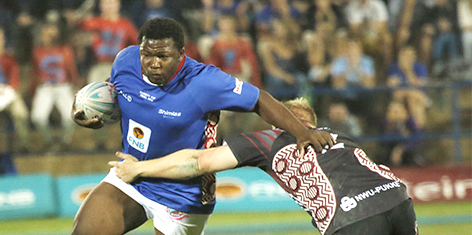
Prop Ox Nche was one of the substitutes who had a huge impact against Tuks in Pretoria on 15 February 2016. Nche and other Shimlas substitutes helped their team wipe out a massive deficit. Photo: Johan Roux.
He has never been involved in a match like this in his rugby career.
This is what Neil Claassen had to say about his team’s performance on 15 February 2016, when the Shimlas came up with one of the biggest fight-backs in the history of the Varsity Cup in Pretoria. According to the Shimlas Captain, his bench had a great impact, and this helped in shocking Tuks with 47-46 towards the end. This came after Tuks had been leading 43-15 in the 44th minute.
Great fighting spirit
The Shimlas' fighting spirit, and a new Varsity Cup points system in which converted tries may count up to 11 points, enabled them to wipe out this deficit.
“It was a tough match, especially after being so far behind,” Neil said.
“Coach (Hendro Scholtz) told us during half-time (when we were 15-36 behind) that we should stay calm."
“We weren't completely out of the game. We knew that if we eliminated unnecessary mistakes, we could make it.”
Impact from bench
This is the second consecutive match - the other was against Ikeys in Cape Town - where the Shimlas’ substitutes swayed the match. “The bench made a big difference,” Neil said. “We also scored an 11-point try, which helped a lot.”
The Shimlas’ fullback, Marco Mason, was named Player of the Match. He succeeded with a tricky conversion to gain victory for his team.
Injuries
The eighth man, Nardus Erasmus (knee) and flanker, Fiffy Rampeta (eye socket), sustained injuries, but should be able to play in the first home game against the Madibaz on 22 February 2016. The injured scrumhalf, Zee Mkhabela (concussion), could return for this match.
Shimlas are second on the log, with nine league points after two away matches. Maties has ten league points.
Young Guns get stuck
The University of the Free State (UFS') Young Guns got stuck 8-14 against Tuks in Pretoria on 15 February 2016.
Vishuis, the UFS's residence team, will start their onslaught in the residence league against Dagbreek in Stellenbosch on 22 February 2016.